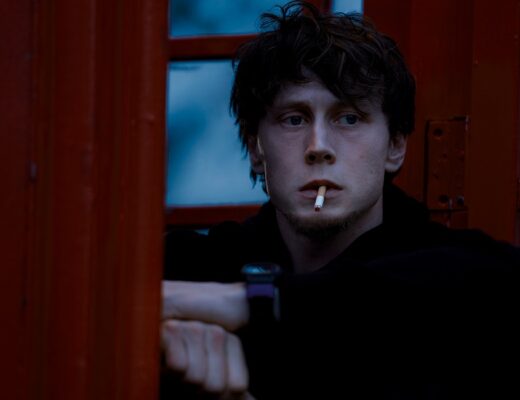“Rock and Roll Band,” the rousing, celebratory track that opens side two of the vinyl LP edition of Boston’s 1976 self-titled debut, spins the tale of the band’s supposed origin story, a rather mundane, cliché narrative of “just another band out of Boston” initially struggling, playing dive bars and sleeping in their cars, then building a name for themselves on the local scene, and finally being discovered by a record label bigwig, who signs them to a lucrative contract. This story, however, was complete bullshit, a fantasy composed by guitarist Tom Scholz, Boston’s founder and main creative force, who was inspired by stories related to him by Jim Masdea, the drummer on this track. The actual story of Boston is far more interesting and unusual than the patently fake one told in “Rock and Roll Band.”
For starters, the band that would later be known as “Boston” essentially didn’t exist at the time most of the songs on their debut were first recorded. These songs, after a painstaking, years-long process of demo recordings, were mostly recorded by Scholz himself in his basement home studio, where he meticulously recreated the original demos, with the assistance of just a few additional musicians: Masdea, replacement drummer Sib Hashian, guitarist Barry Goudreau, bassist Fran Sheehan, and the key element of vocalist Brad Delp. With the exception of Masdea, Scholz and his other hired musicians would form the original official Boston lineup, which became an actual touring entity only after the album was completed.
This arrangement went against the express wishes of their label, Epic, who finally signed the band in 1975, after years of rejections by numerous labels — including Epic initially — of Scholz’s demos, which stretched back to the very early ’70s. Epic wanted Scholz and the band to turn in songs that sounded like the demos, but union mandates dictated that this be done in professional recording studios, with unionized engineers present, and to that end, the label assigned producer John Boylan to work with the band. Scholz balked at this demand, having already worked on these songs for several years, and he believed his home studio already possessed the technical means to render these songs in optimal form.
So Scholz convinced Boylan to help him essentially run a scam on the label, putting on the ruse of having the album recorded in the label-approved studio with the band, while the bulk of the actual recording was still being done by Scholz alone in his home studio. The professional setting was ultimately used only for final mixing and to record the album’s last track, the Brad Delp-penned singles-bar pickup “Let Me Take You Home Tonight,” the only song on Boston recorded with the full band. Considering the anti-corporate ethos of Scholz’s recording methods, as well as the similarly individualistic sentiments of the song “Peace of Mind” — “I don’t care if I get behind / People living in competition / All I want is to have my peace of mind” — it’s ironic that Boston’s music was so often slammed by critics as “corporate rock,” lumping them in with such seemingly personality-free yet massively successful bands as Journey, Styx, Kansas, and REO Speedwagon.
Perhaps some observers got that corporate vibe from the meticulously perfectionist way Scholz layered his guitars, keyboards, and other instruments, which included Brad Delp’s soaring, multi-tracked vocals, the sauce that made this concoction such a sonically potent one. Maybe it was also that Boston’s logo and the similar paintings of guitar-shaped spaceships that adorned their album covers looked very much like corporate branding. Boston’s lack of outsized rock-n’-roll personalities and the attendant de-emphasizing of the band’s individual members — Scholz seems to have wished that no pictures of the band had appeared on the album packaging, even if only relegated to the back cover — were apparently too close to faceless business for some people’s comfort.
However, despite the antiseptic, hermetic nature of the album’s recording, Boston connected with tons of listeners, and this rock album with lots of guitars was a smash, even at the very height of disco. It certainly helped that the record kicked off with the immortal classic “More Than a Feeling,” arguably one of the greatest rock songs ever recorded, the guitar riff on its iconic chorus derived from another rock classic, “Louie Louie” (15 years later, Nirvana would again recycle this riff for their biggest chart hit, grunge anthem “Smells Like Teen Spirit”). Scholz cites The Left Banke’s 1966 hit “Walk Away Renee” as inspiration for his wistful lyrics, which connect nostalgia for old songs and lost loves, and the guitarist’s soft acoustic/loud electric guitar dynamic is exquisitely rendered, while Delp’s keening, heaven-ascending vocal brings this song quite close to perfection.
Boston’s other tracks here don’t quite reach the aesthetic heights of “More Than a Feeling,” often left living in that song’s shadows, but they’re nonetheless accomplished efforts: the rhythmically-driving, organ-powered “Foreplay/Long Time,” the death-wish-somber yet entrancingly lovely “Hitch a Ride,” and the ZZ Top-reminiscent bar-blues boogie “Smokin'” are all particularly memorable cuts in their own right. The album eventually went 17 times platinum, the second best-selling debut of all time, putting it just behind Guns N’ Roses’ “Appetite for Destruction.” In effect, this makes Boston the most successful basement home recording ever, this on top of its enduring notability as the inspiration for an incalculable number of late-night karaoke productions.
Part of Kicking the Canon – The Album Canon.







